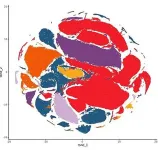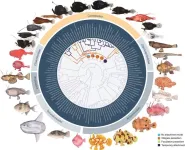(Press-News.org) AUSTIN, Texas — Stress-related disorders like post-traumatic stress disorder and clinical depression are complex conditions influenced by both genetics and our environment. Despite significant research, the molecular mechanisms behind these disorders have remained elusive. However, researchers at Dell Medical School at The University of Texas at Austin have broken new ground with a study that sheds light on the intricate differences occurring in the brains of people with PTSD and depression compared to neurotypical controls. The study, published this week in Science, could provide potential avenues for novel therapeutics and biomarkers.
“Understanding why some people develop PTSD and depression and others don’t is a major challenge,” said investigator Charles B. Nemeroff, M.D., Ph.D., chair of the Department of Psychiatry and Behavioral Sciences at Dell Med. Kerry Ressler, M.D., Ph.D., chief scientific officer at McLean Hospital and professor of psychiatry at Harvard Medical School, and Joel Kleinman, M.D., associate director of clinical sciences at the Lieber Institute for Brain Development, are co-investigators in the study.
“We found that the brains of people with these disorders have distinct molecular differences, especially in the prefrontal cortex. These changes seem to affect things like our immune system, how our nerves work and even how our stress hormones behave,” Nemeroff said.
The study, which included 231 people, examined molecular changes across multiple brain regions using a cutting-edge technique called multiomic analysis. This technique integrates various layers of data, including gene structure and protein expression, providing a holistic view of molecular changes associated with PTSD and depression.
Key findings from the study include:
Identification of specific genes and pathways associated with PTSD and depression, highlighting the role of immune mechanisms, neuronal regulation and stress hormone signaling
Discovery of sex-specific differences in molecular signatures, particularly pronounced in clinical depression
Correlation between childhood trauma, suicide and molecular variations in both disorders
Identification of those shared and unique molecular patterns in PTSD and depression, which could help create new therapeutic avenues and develop blood-based biomarkers
Moreover, the study explored the intersection of brain multiomics with blood proteins, opening up the possibility of using blood-based biomarkers to distinguish risk from disease processes. This provides insight into the neurobiological alterations that underlie the development of PTSD and major depression, which will enable researchers to tailor specific novel and effective treatments for those disorders, Nemeroff said.
The researchers’ primary goals for the study were to understand how different genes and proteins affected the patients, and how epigenetic changes and different brain pathways related to the participants’ PTSD and depression.
“We essentially combined circuit biology with powerful multiomics tools to delve into the molecular pathology behind these disorders,” said Ressler, who is also director of the Division of Depression and Anxiety Disorders and the Neurobiology of Fear Laboratory at McLean Hospital.
The researchers’ findings offer hope for improved understanding and treatment of PTSD and depression, underscoring the importance of multiomic analysis in unraveling the complexities of psychiatric disorders.
“Learning more about the molecular basis of these conditions — PTSD and clinical depression — in the brain paves the way for discoveries that will lead to more effective therapeutic and diagnostic tools,” Kleinman said. “This work was possible because of brain tissue donations to the Lieber Institute Brain Repository from families whose loved ones died of these conditions. We hope our research will one day bring relief to individuals who struggle with these disorders and their loved ones.”
The study was funded by a five-year National Institute of Mental Health grant.
END
Pioneering new study uncovers insights into PTSD & major depressive disorder
Findings may help researchers identify new therapeutic targets and biomarkers
2024-05-23
ELSE PRESS RELEASES FROM THIS DATE:
Two new studies by Mount Sinai researchers in science offer key insights into the origins and potential treatment of mental health disorders
2024-05-23
Working under the umbrella of the PsychENCODE Consortium, the mental health research project established in 2015 by the National Institutes of Health, a team of Mount Sinai scientists has uncovered important new insights into the molecular biology of neuropsychiatric disease through two new studies published in a special issue of Science on Friday, May 24. These investigations, conducted with colleagues from other major research centers, involve the largest single-cell analysis to date of the brains of people with schizophrenia, and a first-of-its-kind ...
Sequencing of the developing human brain uncovers hundreds of thousands of new gene transcripts
2024-05-23
A team led by researchers at UCLA and the University of Pennsylvania has produced a first-of-its kind catalog of gene-isoform variation in the developing human brain. This novel dataset provides crucial insights into the molecular basis of neurodevelopmental and psychiatric brain disorders and paves the way for targeted therapies.
The research, published in Science, also details how transcript expression varies by cell type and maturity, finding that changing gene-isoform expression levels can help ...
Carnegie Mellon University researchers to tackle carbon use, sustainability through NSF expeditions in computing awards
2024-05-23
Researchers from Carnegie Mellon University's School of Computer Science will contribute to two multi-institution research initiatives aimed at reducing the use of carbon and creating sustainable computing.
The projects recently received funding through the U.S. National Science Foundation's (NSF) Expeditions in Computing Awards program, which is providing $36 million to three projects selected for their potential to revolutionize computing and make significant impacts toward reducing the carbon footprint of the lifecycle of computers. The ...
USDA-NIFA grant supports microwave tech to zap weed seeds
2024-05-23
By John Lovett
University of Arkansas System Division of Agriculture
FAYETTEVILLE, Ark. — It’s not just for burritos and popcorn. Microwave technology is also being tested as a new tool to destroy weed seeds and decrease herbicide use.
Scientists and engineers with the Arkansas Agricultural Experiment Station are investigating the use of 915 MHz microwaves to neutralize a variety of weed seeds underground. The study is supported by a nearly $300,000 Agriculture and Food Research Initiative grant from the U.S. Department of Agriculture’s National Institute of Food and Agriculture, with additional support ...
Research spotlight: AI enabled body composition analysis predicts outcomes for patients with lung cancer treated with immunotherapy
2024-05-23
Tafadzwa Chaunzwa, MD, a researcher in the Artificial Intelligence in Medicine (AIM) Program at Mass General Brigham and a senior resident physician at the Harvard Radiation Oncology Program, is the lead author of a paper published in JAMA Oncology. Chaunzwa and senior author Hugo Aerts, PhD, director of the AIM Program, and associate professor at Harvard University, shared highlights from their paper.
How would you summarize your study for a lay audience?
As treatments like immunotherapy improve cancer survival rates, there is a growing need for clinical decision-support tools that predict treatment response ...
Silky shark makes record breaking migration
2024-05-23
In a recent study, researchers from the Charles Darwin Foundation (CDF), in collaboration with the Guy Harvey Research Institute (GHRI) and Save Our Seas Foundation Shark Research Center (SOSF-SRC) at Nova Southeastern University in Florida, and the Galapagos National Park Directorate (GNPD) have documented the most extensive migration ever recorded for a silky shark (Carcharhinus falciformis), revealing critical insights into the behavior of this severely overfished species and emphasizing the urgent need for cooperative international management measures to prevent further population declines.
The ...
Sexual parasitism helped anglerfish invade the deep sea during a time of global warming
2024-05-23
Members of the vertebrate group including anglerfishes are unique in possessing a characteristic known as sexual parasitism, in which males temporarily attach or permanently fuse with females to mate. Now, researchers reporting in the journal Current Biology on May 23 show that sexual parasitism arose during a time of major global warming and rapid transition for anglerfishes from the ocean floor to the deep, open sea.
The findings have implications for understanding evolution and the effects that global warming may have in the deep sea, according to the researchers.
“Our results show how the ...
Archaeology: Differences in Neanderthal and Palaeolithic human childhood stress
2024-05-23
Neanderthal children (who lived between 400,000 and 40,000 years ago) and modern human children living during the Upper Palaeolithic era (between 50,000 and 12,000 years ago) may have faced similar levels of childhood stress but at different developmental stages, according to a study published in Scientific Reports. The authors suggest that these findings could reflect differences in childcare and other behavioural strategies between the two species.
Laura Limmer, Sireen El Zaatari and colleagues analysed the dental enamel of 423 Neanderthal teeth (from 74 Homo neanderthalensis individuals) and 444 Upper Palaeolithic humans (from 102 Homo sapiens ...
Rising temperatures will significantly reduce streamflow in the upper Colorado river basin as groundwater levels fall, new research shows
2024-05-23
The Colorado River makes life possible in many Western cities and supports agriculture that sustains people throughout the country. Most of the river’s water begins as snowmelt from the mountainous watersheds of Colorado, Utah, and Wyoming, and a warming climate will drastically reduce these streamflows, new research finds.
Researchers from Desert Research Institute (DRI), USGS, and Lawrence Berkeley National Laboratory teamed up for the new study, published May 23 in Nature Water. By applying warming to historical conditions for the East River in Colorado and using computer simulations to observe the impact on streamflow and groundwater ...
Prenatal exposure to chemical mixtures and metabolic syndrome risk in children
2024-05-23
About The Study: The findings of this cohort study suggest that prenatal exposure to endocrine-disrupting chemical mixtures may be associated with adverse metabolic health in children. Given the pervasive nature of endocrine-disrupting chemicals and the increase in metabolic syndrome, these findings hold substantial public health implications.
Corresponding Author: To contact the corresponding author, Martine Vrijheid, Ph.D., email martine.vrijheid@isglobal.org.
To access the embargoed study: Visit our For The Media ...
LAST 30 PRESS RELEASES:
Evidence behind intermittent fasting for weight loss fails to match hype
How AI tools like DeepSeek are transforming emotional and mental health care of Chinese youth
Study finds link between sugary drinks and anxiety in young people
Scientists show how to predict world’s deadly scorpion hotspots
ASU researchers to lead AAAS panel on water insecurity in the United States
ASU professor Anne Stone to present at AAAS Conference in Phoenix on ancient origins of modern disease
Proposals for exploring viruses and skin as the next experimental quantum frontiers share US$30,000 science award
ASU researchers showcase scalable tech solutions for older adults living alone with cognitive decline at AAAS 2026
Scientists identify smooth regional trends in fruit fly survival strategies
Antipathy toward snakes? Your parents likely talked you into that at an early age
Sylvester Cancer Tip Sheet for Feb. 2026
Online exposure to medical misinformation concentrated among older adults
Telehealth improves access to genetic services for adult survivors of childhood cancers
Outdated mortality benchmarks risk missing early signs of famine and delay recognizing mass starvation
Newly discovered bacterium converts carbon dioxide into chemicals using electricity
Flipping and reversing mini-proteins could improve disease treatment
Scientists reveal major hidden source of atmospheric nitrogen pollution in fragile lake basin
Biochar emerges as a powerful tool for soil carbon neutrality and climate mitigation
Tiny cell messengers show big promise for safer protein and gene delivery
AMS releases statement regarding the decision to rescind EPA’s 2009 Endangerment Finding
Parents’ alcohol and drug use influences their children’s consumption, research shows
Modular assembly of chiral nitrogen-bridged rings achieved by palladium-catalyzed diastereoselective and enantioselective cascade cyclization reactions
Promoting civic engagement
AMS Science Preview: Hurricane slowdown, school snow days
Deforestation in the Amazon raises the surface temperature by 3 °C during the dry season
Model more accurately maps the impact of frost on corn crops
How did humans develop sharp vision? Lab-grown retinas show likely answer
Sour grapes? Taste, experience of sour foods depends on individual consumer
At AAAS, professor Krystal Tsosie argues the future of science must be Indigenous-led
From the lab to the living room: Decoding Parkinson’s patients movements in the real world
[Press-News.org] Pioneering new study uncovers insights into PTSD & major depressive disorderFindings may help researchers identify new therapeutic targets and biomarkers








